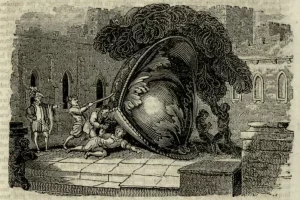 The Castle Of Otranto Summary
The Castle Of Otranto Summary
In 1764, author Horace Walpole published a new form of literacy; the gothic novel. The Castle of Otranto, known as the first gothic book takes place in Italy during the twelfth century. It is a book containing a fundamental plot with ghost, knights, damsels in distress and the continuous battle for the love of a wo66man encompassing many twists and turns along the way. The family that resides in the castle is haunted by an ancient prophecy which no one understands.
Manfred Character In The Castle Of Otranto
Manfred is the lord of The Castle Of Otranto and the father of Conrad. He is a very proud and arrogant man who is determined to keep his family’s name alive. Manfred will do whatever it takes to achieve this, even if it means resorting to violence or breaking the law.
He is also a very superstitious man, which leads him to believe that Conrad’s death was caused by a curse. This causes him to take drastic measures, such as trying to force his daughter, Isabella, to marry him. Manfred is a complex character who is both admirable and reprehensible.
Manfred, the stories gothic villain is an arrogant prince who makes it his mission to find the heir to the throne after his son Conrad mysteriously dies from a giant helmet crushing him. Manfred barely bats an eye after this tragic event and throws his wife Hippolita into the dungeon. Meanwhile, he attempts to take Isabella, Conrad’s bride to be for himself and starts by locking her into the bowels of the castle while he tries to come up with a plan to make her his wife. Matilda, Manfred’s daughter and peasant Theodore’s one true love, is killed during the execution of her father’s reckless acts.
 It is clear that Manfred is an evil character so why do readers still tend to feel sympathy for him throughout the book? Mixed reactions towards the villain of a book are common characteristics of gothic horror fiction. Pain of a villain is more so relatable than the pain of a character that is considered to be good. Manfred is an example of a villain who readers feel sympathy for due to his occasional acts of humanity which causes the evil in himself to be more understandable to the public eye than if he were to be a moral man. Throughout the book there are many instances where Manfred’s humanity breaks way.
It is clear that Manfred is an evil character so why do readers still tend to feel sympathy for him throughout the book? Mixed reactions towards the villain of a book are common characteristics of gothic horror fiction. Pain of a villain is more so relatable than the pain of a character that is considered to be good. Manfred is an example of a villain who readers feel sympathy for due to his occasional acts of humanity which causes the evil in himself to be more understandable to the public eye than if he were to be a moral man. Throughout the book there are many instances where Manfred’s humanity breaks way.
Yes he is villainous and commits sinful acts to gain power but he is not doing so for evil’s sake. Manfred has a sole goal and that is to keep the castle. “All who had known his partial fondness for young Conrad, were as much surprised at their prince’s insensibility, as thunderstruck themselves at the miracle of the helmet… the first sounds that dropped from Manfred’s lips were, Take care of the lady Isabella. ” (Otranto, 19). In this scene Manfred’s son has just been killed and already he started plotting a new plan in order to pursue his goal.
Evidently the ways which he tries to complete his objective are questionable as well as frightening at times considering the power that he possesses over his family. However, the rare moments where readers witness his heart really stand out, which in effect results in the feeling of sympathy. “He even felt a disposition towards pardoning one who had been guilty of no crime. ” (Otranto, 31). It is often found that characters who display emotions and some moral sense appear to be human which makes people accept their faulty behaviours such as the venture for power and control that Manfred demonstrates.
Matilda The Castle of Otranto
Matilda is one of the main characters in The Castle of Otranto, and she is an incredibly important figure in the story. She is the daughter of Prince Manfred, and she is betrothed to Conrad, the son of Prince Frederic. However, Matilda’s life is turned upside down when her father decides to marry Isabella, a woman who is not of royal blood.
This causes a great deal of conflict within the castle, and Matilda finds herself caught in the middle. Despite all of this, Matilda remains a kind and gentle person, and she eventually falls in love with Theodore, a man who is beneath her station. The Castle of Otranto is a classic horror story, and Matilda is a key character in the book.
When the book showcases that there is some humanity living inside of Manfred, he automatically becomes more relatable as someone who makes mistakes and has human desires. The public defines a villain as someone who has separated him/ herself from the nature of a human and is considered supernatural and unstoppable by people. At first, this is the sense readers get from Manfred yet as the book progresses, the idea of him being supernatural begins to fade as he starts demonstrating his humanity. “Manfred’s heart was capable of being touched. He forgot his anger in his astonishment” (The Castle of Otranto, 53).
In this scene of the novel, Manfred finds out that Theodore is Jerome’s son and for a moment forgets his anger towards the peasant. After Jerome begs the prince to spare his son, Manfred finally agrees under condition. This demonstrates that Manfred’s heart is indeed capable of being touched and gives reason to readers for in a way being proud of the prince’s compromise. By the end of the novel, Manfred became overwhelmed with guilt and punishes himself which resonates in the reader as somewhat of a tragedy. This is where the reader’s empathy towards the prince may become certain.
Thou guiltless but unhappy woman! Unhappy by my crimes! Replied Manfred… let me at last do justice on myself! To heap shame on my own head is all the satisfaction I have left to offer to offended heaven. ” (Otranto, 103). Because Manfred feels regret, the reader is able to accept him more than a real villain who only commits sin for the sake of being sinful and having no regrets when harming others. Manfred is also very smart and cunning which gives readers another reason to sympathize with him because you know that the things he says are not empty words.
It is witnessed in many situations that Manfred was always able to change his game plan with the blink of an eye which proves that he is very intelligent. He is capable of thinking on his feet and knows the difference between good and bad so in the end when he finally takes responsibility for his actions, readers are more accepting. At the end of The Castle of Otranto, readers almost feel bad for Manfred when he punished himself for all the sins he has committed, he is blamed less for his wrongful acts. Readers don’t necessarily forgive him but they understand why he acted the way he did and somewhat feel sorry for him.
A bully in high school will pick a victim and torment him/her on a regular basis. This bully is seen as evil in the eye of almost everyone at school, people are scared of him/ her and do their best to avoid being the next victim of mentally or physically aggressive behaviour. However, once that bully comes out of the dark, takes responsibility for his/her actions and gives reason for the wrong doings, she/he is no longer considered evil. The bully is understood by peers and even felt sorry for. As long as faulty behaviour is circumstantial and has reasoning behind it, people are likely to identify and relate.
Manfred committed sin because he was trying to achieve something that he had set his mind on. He was fully aware of his actions and at times showed his heart therefore he wasn’t being evil just for the sake of it. Manfred was determined to run away and avoid his fate set by the prophecy, he was willing to do anything which gives readers the ability to draw back to their own personal experiences. Manfred’s situation can be compared to that of the Creature’s from the book Frankenstein. Frankenstein’s creation caused a lot of trouble while roaming free; it killed people and destroyed a lot.
The creature was considered the villain of the story yet its immoral actions were due to the circumstances that it was brought into. The creature was brought into a world where fate was its life’s determining factor which is a very similar situation as the one of Manfred. Manfred, the arrogant prince in the book The Castle of Otranto displayed many moments of humanity amidst his continuous acts of evil. This in effect results in the feeling of sympathy from readers as these moments of goodness allow people to identify with the character and understand the reasoning behind his wrong doings.
Manfred is a very intelligent and cunning character who recognises right from wrong and is able to eventually accept his fate and take responsibility for his actions. It is not uncommon for readers to empathize with the villain of gothic stories and it is evident as to why. When someone who is known for their faulty behaviour acts out of perceived character and displays their humanity, it is more noticeable to the readers and makes it easy to relate. True villains are supernatural beings who have no shame and no regrets, so when a supposed villain portrays morality, readers begin to question whether they are truly and internally evil or not.